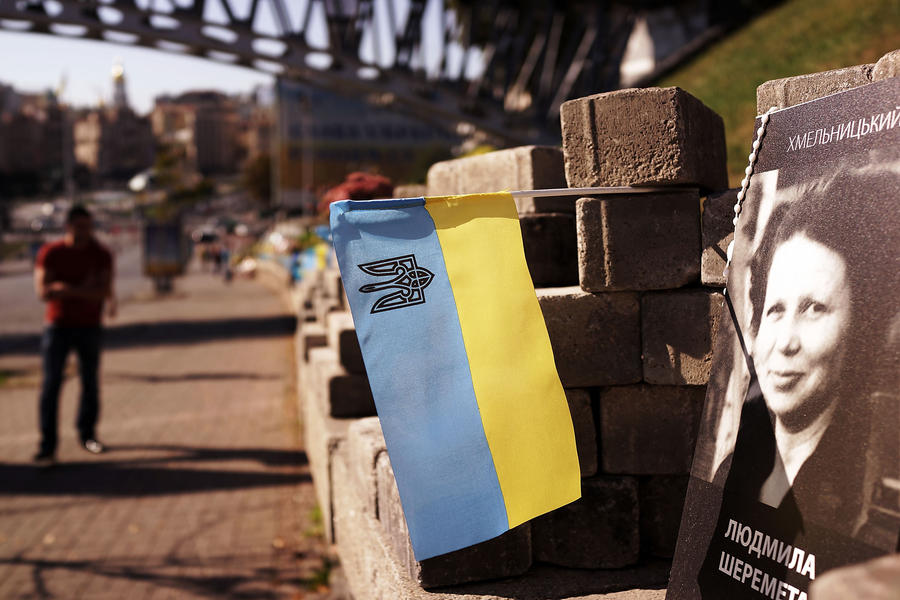Obama skeptical of fragile Ukraine ceasefire: 'It has to be tested'


A free daily email with the biggest news stories of the day – and the best features from TheWeek.com
You are now subscribed
Your newsletter sign-up was successful
An open-ended ceasefire between Ukrainian troops and pro-Russian militants seems to be holding, The Associated Press reports — but both sides are still on edge.
The agreement, signed on Friday by Ukraine, Russia, and Moscow-backed separatists, stipulates withdrawals of heavy weaponry, exchanges of prisoners, and distributions of humanitarian aid in eastern Ukrainian cities that have been hardest hit in the past four months. The fighting has claimed more than 2,600 civilian lives and left thousands more homeless, according to the United Nations.
But less than a day into the ceasefire, each side has already claimed that the other has violated its terms — although reporters on the ground and local officials say they have not heard any shooting or shelling. The tenuous nature of the ceasefire left Western leaders doubting whether Russia will truly retract its assistance to the militants in Ukraine.
The Week
Escape your echo chamber. Get the facts behind the news, plus analysis from multiple perspectives.

Sign up for The Week's Free Newsletters
From our morning news briefing to a weekly Good News Newsletter, get the best of The Week delivered directly to your inbox.
From our morning news briefing to a weekly Good News Newsletter, get the best of The Week delivered directly to your inbox.
"It has to be tested," President Barack Obama said on Friday at the closing of a two-day NATO summit.
German Chancellor Angela Merkel agreed, noting the additional sanctions on Russia that were preliminarily approved by the European Union on Friday, and could go into effect as early as Tuesday.
"We have to see whether this ceasefire is being applied," Merkel said. "Do Russian troops withdraw, so far as they're there? … If certain processes get underway, we are prepared to suspend sanctions."
If applied, the new round would restrict Russia's access to defense and arms trade, along with other technologies. More Russians would also be banned from entry into the trade bloc, and their assets would be frozen.
A free daily email with the biggest news stories of the day – and the best features from TheWeek.com
Sarah Eberspacher is an associate editor at TheWeek.com. She has previously worked as a sports reporter at The Livingston County Daily Press & Argus and The Arizona Republic. She graduated from Northwestern University's Medill School of Journalism.
-
 6 exquisite homes with vast acreage
6 exquisite homes with vast acreageFeature Featuring an off-the-grid contemporary home in New Mexico and lakefront farmhouse in Massachusetts
-
 Film reviews: ‘Wuthering Heights,’ ‘Good Luck, Have Fun, Don’t Die,’ and ‘Sirat’
Film reviews: ‘Wuthering Heights,’ ‘Good Luck, Have Fun, Don’t Die,’ and ‘Sirat’Feature An inconvenient love torments a would-be couple, a gonzo time traveler seeks to save humanity from AI, and a father’s desperate search goes deeply sideways
-
 Political cartoons for February 16
Political cartoons for February 16Cartoons Monday’s political cartoons include President's Day, a valentine from the Epstein files, and more
-
 British warship repels 'largest Houthi attack to date' in the Red Sea
British warship repels 'largest Houthi attack to date' in the Red SeaSpeed read Western allies warn of military response to Iranian-backed Yemeni rebels if attacks on ships continue
-
 Houthi rebels claim Red Sea ship attacks
Houthi rebels claim Red Sea ship attacksspeed read Iran-backed Yemeni group vows to escalate aggression towards Israel-linked vessels in revenge for Gaza war
-
 Israel plans next phase of Gaza war as first hostages released
Israel plans next phase of Gaza war as first hostages releasedSpeed read After four-day ceasefire 'we will not stop' until destruction of Hamas, says Israel
-
 Mob storms Russian airport 'looking for Jews'
Mob storms Russian airport 'looking for Jews'Speed Read Plane from Israel surrounded by rioters chanting antisemitic slogans after landing in Russia's Dagestan region
-
 Tuberville's military promotions block is upending lives, combat readiness, 3 military branch chiefs say
Tuberville's military promotions block is upending lives, combat readiness, 3 military branch chiefs saySpeed Read
-
 Ukraine's counteroffensive is making incremental gains. Does it matter in the broader war?
Ukraine's counteroffensive is making incremental gains. Does it matter in the broader war?Speed Read
-
 US commissions first-ever Navy ship in a foreign port
US commissions first-ever Navy ship in a foreign portSpeed Read
-
 British spy chief, Wagner video suggest Prigozhin is alive and freely 'floating around'
British spy chief, Wagner video suggest Prigozhin is alive and freely 'floating around'Speed Read
